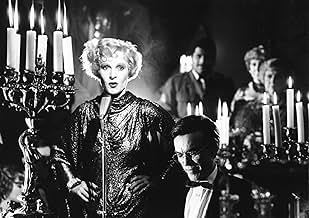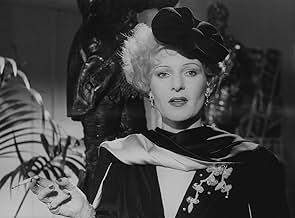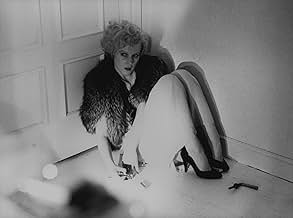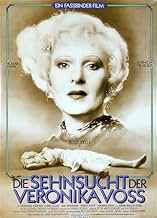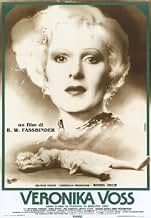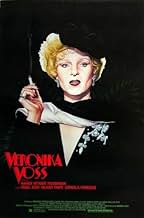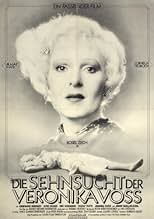Partially based on the life of Sybille Schmitz, who found fame under the Nazi regime, but whose career was destroyed afterward. Veronika Voss is a once prominent UFA actress, kept by her doc... Read allPartially based on the life of Sybille Schmitz, who found fame under the Nazi regime, but whose career was destroyed afterward. Veronika Voss is a once prominent UFA actress, kept by her doctor, who raises suspicion in a sports journalist.Partially based on the life of Sybille Schmitz, who found fame under the Nazi regime, but whose career was destroyed afterward. Veronika Voss is a once prominent UFA actress, kept by her doctor, who raises suspicion in a sports journalist.
- Director
- Writers
- Stars
- Awards
- 4 wins & 4 nominations total
- G.I.
- (as Günter Kaufmann)
- …
- Director
- Writers
- All cast & crew
- Production, box office & more at IMDbPro
Featured reviews
It is beautifully written by his regular collaborators Peter Marthesheimer and Pea Froelich, shot in knife-like black and white by his preferred cinematographer Xavier Schwarzenberger and as one would expect from this director, features a strong leading role for an actress, in this case Rosel Zech, whose character is loosely based upon that of the fascinating but tragic Sybille Schmitz who despite never being fully accepted by Herr Goebbels and company found it virtually impossible to continue her post-war career because of her perceived Nazi connections and whose drug-fuelled downward spiral ended in suicide in 1955.
Zech is simply stupendous in a demanding role that requires a wide range of emotions and as a bonus she performs a beguiling, Dietrich-like rendition of 'Memories are made of this." As a lesbian Dr. Feel-good, there is a magnificently chilling performance by Annemarie Dueringer. The entire cast is uniformly excellent and all of the characters are well drawn. Armin Mueller-Stahl again makes his presence felt whilst the influence of America in the Germany of the time is epitomised by the sound track and not least by the presence of the ubiquitous African-American GI played as always by Guenter Kaufmann. As well as being a tribute to the mighty UFA Studios, the relationship between fading star Voss and the journalist of Hilmar Thate is a nod to 'Sunset Boulevard'.
There is an absence of socio-political comment here and the whole enterprise succeeds solely through the myths of the movies. Fassbinder was an avowed devotee of the dream factory that was Hollywood and professed his adoration for Douglas Sirk. As it happened the master long outlived the pupil and Sirk offered a fitting tribute:"Although his fims were controversial.....only those things that survive opposition have the power of permanence."
The plot is decent; it would have been a really good one for a classic Hollywood film starring Joan Crawford or Bette Davis or someone like that. Its greatest worth is in the performance of Rosel Zech, who has the titular role. Cornelia Froboess as Robert's girlfriend and Annemarie Düringer as the wicked doctor are also good. The character of Robert is never very interesting. The black and white cinematography (Xaver Schwarzenberger) and the unconventional score (Peer Raben) are very good. The tape I watched was not in a very good condition, so I may have liked it more if I had seen a better copy. 8/10.
"Die Sehnsucht der Veronika Voss" is a melancholic, bitter and depressive tale based on the reality of an era, and the association with "Sunset Boulevard" is immediate. The story is based on the last years of the German actress Sybille Schmitz (1909-1955), who died due to an overdose of sleeping pills. The performance of Rosel Zech is impressive, showing the glamour of a former star in the Nazi period and the depression of an addicted woman in the 50's. Hilmar Thate is also perfect in the role of a simple innocent man that faces a greedy world of pain and death. The magnificent cinematography in black and white, using perfectly light and shadows, is homage to the Golden Age of Hollywood. My vote is eight.
Title (Brazil): "O Desespero de Veronika Voss" ("The Despair of Veronika Voss")
One of the last of Fassbinder's films - he died of an overdose (the official conclusion was suicide) in 1982 - which was also the last of a trilogy focusing on Germany's economic boom in the 1950's (the others being The Marriage of Maria Braun (1979) and Lola (1981)), the film also reflects some of the themes that the New German Cinema at the time. It was a time that Germany was reflective of World War 2, and the trauma that prevailed in a country torn between guilt and a resurgence of decadence and wealth as in the 1920's Weimar Republic. It is stated in the film that Voss's best period was during this period, and that she had been the star of Nazi Germany. After the fall of Nazi domination, she was cast aside.
Like Billy Wilder's Sunset Boulevard (1950), Veronika Voss highlights an industry that can easily create monsters, and also devastate lives. But unlike Wilder's subtle version of lost fame, Fassbinder shows the devastating effects of drug addiction, and the underbelly of society that is encountered in this process. Historically though, this is deeper and a hell of a lot more emotionally charged and interesting than Sunset. After all, this is not a Hollywood story, but is a post-World War 2 story of judgement, and loss after such a integrally debasing event in human history. How do you continue after working under the despotic power of the Nazi party? The elements of Nazi Germany are still in process, in the form of Veronika's control.
The film is said to be based upon the real-life German film actress, Sybille Schmitz, who died of an overdose in 1955 at the tender age of 45. The film shows shows that the shadow of the war had a lasting effect on the German nation, that would take decades to come to terms with. This is film making par excellence. Haunting, beautiful, with a climax that is inevitable, shocking, but very satisfactory. Rosel Zech's performance is pitch perfect, her face in a constant state of anguish.
www.the-wrath-of-blog.blogspot.com
Fassbinder's film which was shot in black and white visually is very impressive. "Light and shadows are two cinema's best secrets" says Veronika in the movie and light and shadows make the film a joy to behold. I like it but I think it is the weakest part of the trilogy perhaps because "Lola" and "Maria Braun" are so strong. I found the documentary about Sybille Schmitz, "Dances with Death" which is included on Criterion DVD much more compelling.
Veronika - 7/10 Dances with Death 8.5/10
Did you know
- TriviaBased on the true story of German film star Sybille Schmitz.
- GoofsThe film is set in 1955 but the song "The Battle of New Orleans" by Johnny Horton, released in 1959, is heard on the radio a number of times.
- Quotes
Dr. Marianne Katz: Artists are different from ordinary people. They are wrapped up in themselves, or simply forgetful.
- How long is Veronika Voss?Powered by Alexa
Details
- Release date
- Country of origin
- Languages
- Also known as
- Veronika Voss
- Filming locations
- Production companies
- See more company credits at IMDbPro
Box office
- Budget
- DEM 2,600,000 (estimated)
- Gross US & Canada
- $8,144
- Opening weekend US & Canada
- $11,623
- Feb 16, 2003
- Gross worldwide
- $8,158
- Runtime1 hour 44 minutes
- Color
- Sound mix
- Aspect ratio
- 1.66 : 1
Contribute to this page


